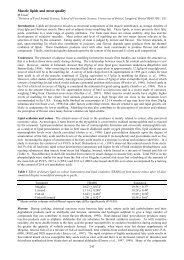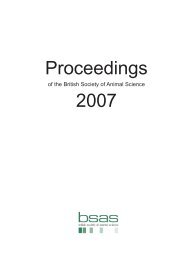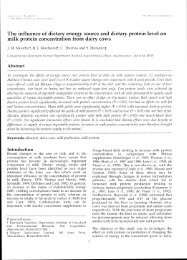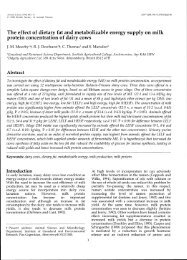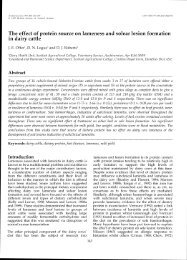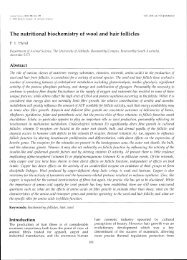PROGRAMME - British Society of Animal Science
PROGRAMME - British Society of Animal Science
PROGRAMME - British Society of Animal Science
You also want an ePaper? Increase the reach of your titles
YUMPU automatically turns print PDFs into web optimized ePapers that Google loves.
207<br />
Linking science and skills in agriculture<br />
R Longthorp<br />
LKL Farming . Burland . Holme Road . Howden . Goole . Yorkshire, UK<br />
Email: rlongthorp@longthorp.com<br />
Is there a need for a link between science and skills? If there is a need, then is there a link in place and is it effective?<br />
The answer to the first question is unequivocally yes. There has to be a clear and effective link between science and skills if<br />
real value is to be realised and delivered to industry and society from science and technology.<br />
The primary function <strong>of</strong> applied science should not be the science per se, but the application <strong>of</strong> it. Not what the research shows<br />
but what the research allows to happen as a consequence. If nothing positive happens as a consequence <strong>of</strong> the research or if the<br />
full potential <strong>of</strong> the research is not realised then time and resource have been wasted and value lost. Would scientists want to<br />
be remembered for great science or great impact?<br />
But scientists are, for the most part, totally dependent on others to help and apply their science - the extension <strong>of</strong>ficers and<br />
farmers. By the same token, the farmers and extension <strong>of</strong>ficers rely upon the skills <strong>of</strong> the scientist to carry out good quality<br />
research. There is also a joint responsibility to determine just what needs researching. It is in the common interest, therefore,<br />
that all within the triumvirate <strong>of</strong> applied scientists, extension <strong>of</strong>ficers and farmers are not only competent but also constantly<br />
working to maintain and improve their contemporary competence and pr<strong>of</strong>essional standards.<br />
By improving skills across the piece, developing stronger relationships with those upstream and downstream and by targeted<br />
research and its effective application, more value can be added to the whole process.<br />
Adding synergistic value through collaborative and complementary working is not new and there is a parallel with existing<br />
collaborative models. The concept and benefits <strong>of</strong> value added through integrated supply chains has been recognised for some<br />
time by both economists and those operating in industry alike. The value <strong>of</strong> the (integrated) whole can be significantly greater<br />
than the value <strong>of</strong> the sum <strong>of</strong> the parts.<br />
The same should be true <strong>of</strong> an integrated approach to science, extension and skills. Integration should lead to better directed<br />
science, better translated science and better implemented science. The result is that more total value is generated, part <strong>of</strong> which<br />
can be ploughed back into further research, technology, extension and skills and even more value added. Does the term<br />
“Technology Value Chain” exist? Perhaps it should do. Perhaps it should be implicit in all Supply Value Chains.<br />
Whilst most agricultural sectors can claim to have a science, R&D and extension <strong>of</strong>fer, only a few could claim to have a skills<br />
<strong>of</strong>fer that is integrated into the mix. The pig industry is one <strong>of</strong> these but even this would have to be described as “work in<br />
progress”. Most <strong>of</strong> the effort has thus far been concentrated on technical skills at farm level. Recently more attention has been<br />
paid to leadership and management skills. This has given a quantum step in terms <strong>of</strong> achieving behavioural change. Lessons<br />
can be learnt by the science fraternity by not just looking at technical skills but also incorporating those other s<strong>of</strong>t,<br />
management and leadership skills necessary to get the best out <strong>of</strong> industry’s limited resources. Furthermore, as with primary<br />
production, there is also a need to help develop the higher level skills and pr<strong>of</strong>essional standing and recognition <strong>of</strong> the<br />
scientists so that applied agricultural science is seen as a career <strong>of</strong> choice.<br />
Looking at the broader picture, it is encouraging to note that the Agriculture and Horticulture Development Board are starting<br />
to recognise the importance <strong>of</strong> not only skills but also the relationship between science, extension and skills. However, a<br />
primary pre-requisite for this initiative to gain traction is for all sectors to have comprehensive skills <strong>of</strong>fers. In the meantime<br />
the pig industry can hopefully demonstrate what value is possible by further refining its integrated <strong>of</strong>fer <strong>of</strong> science, extension<br />
and skills.<br />
20



